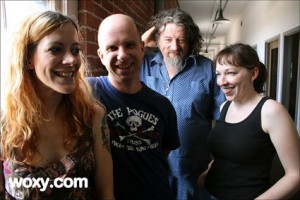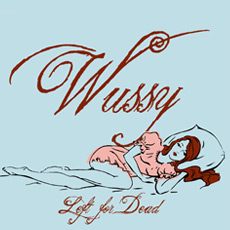 At peace maintaining proverbial underdog status and in spite of their peculiar pansy-like moniker, working class quartet, Wussy, find comfort pleasing an always- evolving, if ever-shrinking, underground rock mass. Making two ambitious albums under the tutelage of Chuck Cleaver (former front man for auspicious Cincinnati beacons, the Ass Ponys), Wussy endure just inches below indie rock’s fragile surface, struggling for narrow underground airplay but seemingly content entertaining a loyal coterie.
At peace maintaining proverbial underdog status and in spite of their peculiar pansy-like moniker, working class quartet, Wussy, find comfort pleasing an always- evolving, if ever-shrinking, underground rock mass. Making two ambitious albums under the tutelage of Chuck Cleaver (former front man for auspicious Cincinnati beacons, the Ass Ponys), Wussy endure just inches below indie rock’s fragile surface, struggling for narrow underground airplay but seemingly content entertaining a loyal coterie.
Sure the humble unit deserves better recognition, perhaps on the level attained by
poppier San Francisco coed combo, Imperial Teen, who sell in the higher thousands. Reluctantly, Wussy instead vie for attention with similarly assimilated bands ranging from the artily plaintive High Water Marks to the enchantingly twee Chalets. Yet much like (one-quarter female) hometown heroes, the Heartless Bastards, a great camaraderie is shared by Cleaver’s eager crew, despite the low-rent subterranean lifestyle afforded, or afflicting, perennial indie-dom.
But don’t go feeling too sorry for the undervalued group since its members don’t lack decent outside employment. Cleaver’s proud to be a longtime mason in his other life while the remaining three eke out fair livings in education and the food industry. And several respected scribes, such as the ubiquitous Robert Christgau, have shown affection for and devotion to the multitasking voyagers needy for small hotel luxuries this wet evening in north Jersey as their month-long tour nears close.

The lithesome over-thirty gang go back-jack do-it-again for beefed-up ’07 long-player,
Left For Dead (Shake It Records), laying on
s’more dusky satire but always remembering to tersely bring out the noise. One-upping the bitterly dire referencing of ‘05s equally ominous titular titillation,
Funeral Dress, the oft-times better
Left For Dead’s roughhewn boogie down rockers, employed judiciously in concert, confidently counterbalance refreshingly provocative Appalachian folk-acoustic retreats.
At Maxwells in Hoboken this March, the burly, longhaired, scraggly-bearded Cleaver looks like Jerry Garcia on a bender, contrasting frail cutesy-faced co-leader, Lisa Walker, whose vivacious personality helped make her the focal point.
"Fifty and beyond I’m gonna look like a tramp," the 48-year-old Cleaver jokingly guffaws over macaroni-and-cheese dinner beforehand.
He confides, "I don’t particularly like being the front person. I like playing guitar and composing. She’s easier to look at. That may sound chauvinistic, but it’s true."
Live, his inelastic voice has a huskier masculinity, and hers, a deeper emotional resonance. Their repertoire gets executed abrasively louder, but not at the expense of persuasive melodic eloquence. Cleaver’s a right-staged corner-bound dark figure sparking spontaneous riffs while fellow singer-guitarist Walker’s the surprisingly assured central focus. Forming the resolute rhythmic backbone are efficient bassist Mark Messerly and athletic drummer Dawn Burman.
Wearing a fancy cheaply-bought leather-billed wool-topped corduroy-backed cap, Cleaver, retired leader of admirable major-labeled Americana band, the Ass Ponys, began doing solo dates a few years back, convincing Walker (whom he met "in passing") to sing along at local venues. He’d write lyrics down for Walker during rehearsal and felt the onstage interplay "sounded wonderful."
"We were a two-piece. Then we found Mark," Cleaver recalls. "At our first few shows, we told people even though we’re quiet now, we’re gonna be loud one of these days."
Accordingly, the zealous threesome learned as they went, acquiring sturdy stick-handler Burman to fill out and add punch up the impulsive Cleaver-Walker originals.
"I’m not really a lead guitarist. And Mark never played bass," Cleaver insists. "It was learn as you go. Lisa and Dawn had never been in a band. We sucked for a long time and got better. I like that. The Ass Ponys weren’t any good at first. You get better. There’s an element of surprise."
Undeniably, Cincinnati’s incestuous underground scene, conducive to moonlighting musicians setting up ancillary collectives, also befits Cleaver and Walker. They sometimes play out under the alias of Appalachian Cancer. Moreover, Walker’s on one record by Chi-town folk-pop band, the Haywards, and sidelines in "super duper side project," the Evil Chauncers.
"There’s soul to the North, bluegrass and Country to the South," Cleaver adds. "We don’t have to be cool. Observing the hipster trends for the last two years, what’s cool changes and quickly falls out of fashion. Cool bands mostly snub us, but then fade away."
"We’re right near the Mason-Dixon Line and are closer to the economically depressed recession," Walker chirps in.
Though Walker’s father had a nylon-string Classical guitar she learned Dylan-composed Peter Paul & Mary songs on, the then-teenaged lass never picked up an electric 6-string. Notwithstanding constant practice working out chord arrangements a decade thereafter, she daringly performed in front of small crowds before being totally ready, which may’ve "scared the shit" out of her, but over time led to greater sonic development.
Burman interjects, "I have to say when I didn’t know how to play drums, it was humiliatingly awful. At least I had three people in front of me. This was Lisa’s first band and she’s learning onstage in the center of it all."
Walker chimes in, "Chuck always said if people threw shit at us, he’d block it. But someone threw a fish at him one time."
"Yeah," Cleaver smirks. "Opening for (noise-rock Industrialists) Jesus Lizard, they hit me full-on. I guess they were gonna save it for David Yow. But they got this frozen fish from the market – it was heavy – and it hit me right in the chest."
Nevertheless, Cleaver points towards his band mates then proudly proclaims, "These people have passion. I don’t wanna play with guys who could do all the licks. That doesn’t interest me. I appreciate that in other bands. Most bands we play with are more musically proficient. But they can’t bring across our melodic sense. They’re not gonna beat us at writing. We’re good goddamn writers. I’m not good looking. I can’t fuckin’ sing, but motherfucker, I could write! Lisa can do both. She’s also taught me how to sing better and get on key once in awhile."
Left For Dead’s hard-driving weather-beaten tone could best be summed up by Cleaver’s nasally snarled vindication, "What’s His Name." On the other end, his earnestly capitulated balladic quiver suits warbled lead-in, "Trail Of Sadness" (re-addressing the debut’s whiny opening frailty, Airborne"). In between, the eruptive Walker-sung dual-axe scree, "Rigor Mortis," and the sinisterly scarifying, "Killer Trees," call to mind blistering Sonic Youth scrums.
Against the grainy bulk, Walker captures some of Joni Mitchell’s poetic mellifluence and much of Chrissie Hynde’s quavered love-struck urgency on the euphonious "Mayflies," whereas fervid resplendence, "Jonah," infrequently summons the jangled Brit-folk lucidity of Fairport Convention alumnus, Linda Thompson.
As with
Funeral Dress, shrapnel-like fuzz-pedaled guitar sprees come and go alongside occasional heartland romancers. In comparison, the storm-tossed "Melody Ranch" reinvigorates the full-blown climactic tempest of "Yellow Cotton Dress" (sans xylophone, bells, and carnivalesque organ whirl).
"Wussy is my favorite thing I’ve ever done. It’s a privilege to do this," Cleaver fervently declares.
"I started out at age 30 in the Ass Ponys," he concludes. "I had a house and family. We’d figure costs to go out on the road and get more money each time. We milked (A & M Records) for three years. But Wussy won’t be able to go tour again for at least another year. I have to lay stone when I get home in three days – go back to work. We’ll do local gigs and hit D.C. and Baltimore, but Dawn’s a school teacher, Mark’s a music teacher, and Lisa manages a vegetarian restaurant."
Post-set, Walker presumes they’ll get home and once again pen a few new tunes, pile ‘em together, and see which ones float.
Pragmatically, she concedes, "We’ll scratch a few up, go in with the little group, and some ideas will or won’t work. It just so happened more of mine were used this time. We do it the Beatles way – singing what we write, usually. Next time, we want to expand our range. We did a new fast one tonight, "Death By Misadventure." But that’s not far off the beaten track."
FOREWORD: Ass Ponys singer-guitarist, Chuck Cleaver (now co-fronting hard pop combo, Wussy), may not be a household name, but I dare you to find a straightforward rock band as consistently good as his equine-christened quartet. The Ass Ponys did get that pie-in-the-sky major label deal for ‘94s excellent Electric Rock Music and ‘96s sturdy The Known Universe, but aboveground airplay was not forthcoming so they returned with little fanfare to welcomed indie-dom. As for Cleaver, he’s a husky composer whose resourceful allegoric sketches enjoin basic melodic folk, rock, and country-blues arrangements. I saw the Ass Ponys play twice (Mercury Lounge and the defunct Brownies) before they unfortunately called it a day ‘round ‘05. But their tunes will live on just as long as anyone wants to pick up any of their ‘90s discs. On a few occasions, I’ve spoken to Cleaver about long-lost small label artists, since both of us have tremendous knowledge concerning Anglo-American music. I’ve also done a piece on his ensuing band, Wussy. This article originally appeared in Aquarian Weekly.
 Signed to A & M Records following a few locally distributed records, the Ass Ponys released ‘94s eye-opening Electric Rock Music (featuring the novel mini-hit, "Little Bastard") and ‘96s nearly as good The Known Universe. After getting dropped by A & M, they borrowed a dumbfounded line from Deep Purple’s classic "Smoke On The Water" for the title of the small-labeled Checkered Past re-entry, Some Stupid With A Flare Gun, then hit the studio a year later for ‘01s even better Lohio.
While fast food ode, "Only," and disjointed swamp water country-Blues elegy, "Baby In Jar," hearken back to acid-folk jug band, the Holy Modal Rounders, sweet acoustic fare such as the lonesome, "Dollar A Day," and dirge-y "(Baby) I Love You (Baby)," bring to mind Neil Young’s more contemplative moments.
Alongside Cleaver, the Ass Ponys include fellow original member, bassist Randy Cheek, drummer Dave Morrison (who came aboard for ‘92s little-known indie-released Grim), and banjo playing guitarist Bill Alletzhauser (the youngest of the group).
I spoke to Cleaver over the phone as he watched from his porch as a hell-bent northerly thunderstorm settled in.
Some of the Ass Ponys stranger material reminds me of the Holy Modal Rounders. Do you even know who they are?
CHUCK: Yeah. "Baby In A Jar’ is very much in that mode. I collected the ESP label for awhile. There’s stuff that makes the Holy Modal Rounders seem regular. There’s a band called the Godz. Then, there’s Erica Polmeranz, a mystical hippie with witchy sounding stuff. I think they re-released some of their stuff on CD. There’s an underground cartoonist, Gilbert Shelton, who came out of Texas. There’s actually a 45 on ESP with a picture sleeve by the Gilbert Shelton Ensemble that’s really hard to find. It’s absolutely terrible, but worth having. There’s some screwed-up Jazz by Albert Ayler. There was an ESP distributor in the late ‘60s, and that’s how I found most of the stuff.
So you collect a lot of obscure memorabilia.
CHUCK: I’ve collected records since I was thirteen years old. I mostly collect weird old stuff from a certain genre, like obscure ‘60s garage bands and surf-type instrumentals. I used to have a friend in L.A. who found me a lot of California stuff.
Lohio seems very reflective of backwoods Ohio or rural living.
CHUCK: I like that. It’s a fairly ambiguous title. It juxtaposes low and high and up and down. There was a band called Lohio that changed their name, and I called them up to see if I could use their name. They said, ‘Sure.’
I thought the album might be loosely thematic. The opener, "Last Night It Snowed," ends in dramatic orchestral fashion.
CHUCK: It moves in a thematic way. There’s a thread running through it, but I don’t know if it was intended. Our songs just come about. We never preconceive them or take a lot of time in the studio.
What’s with the ‘pot lick limp dick’ "Butterfly"?
CHUCK: That’s basically about this guy that’s all talk and no action. He yaks and talks big. Like these guys trying to jump the canyon that have inverse peckers and don’t do anything. They sit in front of the t.v.
How’s life on the road?
CHUCK: We played Twangfest recently. I was so drunk. It’s fun to look like a moron sometimes. But the shoegazers don’t dig that shit. You’re supposed to be intent and look at the floor, and instead, we’re all over the place. Anyway, we felt like the turds in a punchbowl at Twangfest. There were all these country bands, and I was just really paranoid and the bartendress was really nice, pouring Jagermeister like it was creek water. I was drinking the hell out of it. Pretty soon, I couldn’t stand up. That was a bad thing. I got testy with my words and mocked out cowboy hats. But it went over well. We did fine.
Signed to A & M Records following a few locally distributed records, the Ass Ponys released ‘94s eye-opening Electric Rock Music (featuring the novel mini-hit, "Little Bastard") and ‘96s nearly as good The Known Universe. After getting dropped by A & M, they borrowed a dumbfounded line from Deep Purple’s classic "Smoke On The Water" for the title of the small-labeled Checkered Past re-entry, Some Stupid With A Flare Gun, then hit the studio a year later for ‘01s even better Lohio.
While fast food ode, "Only," and disjointed swamp water country-Blues elegy, "Baby In Jar," hearken back to acid-folk jug band, the Holy Modal Rounders, sweet acoustic fare such as the lonesome, "Dollar A Day," and dirge-y "(Baby) I Love You (Baby)," bring to mind Neil Young’s more contemplative moments.
Alongside Cleaver, the Ass Ponys include fellow original member, bassist Randy Cheek, drummer Dave Morrison (who came aboard for ‘92s little-known indie-released Grim), and banjo playing guitarist Bill Alletzhauser (the youngest of the group).
I spoke to Cleaver over the phone as he watched from his porch as a hell-bent northerly thunderstorm settled in.
Some of the Ass Ponys stranger material reminds me of the Holy Modal Rounders. Do you even know who they are?
CHUCK: Yeah. "Baby In A Jar’ is very much in that mode. I collected the ESP label for awhile. There’s stuff that makes the Holy Modal Rounders seem regular. There’s a band called the Godz. Then, there’s Erica Polmeranz, a mystical hippie with witchy sounding stuff. I think they re-released some of their stuff on CD. There’s an underground cartoonist, Gilbert Shelton, who came out of Texas. There’s actually a 45 on ESP with a picture sleeve by the Gilbert Shelton Ensemble that’s really hard to find. It’s absolutely terrible, but worth having. There’s some screwed-up Jazz by Albert Ayler. There was an ESP distributor in the late ‘60s, and that’s how I found most of the stuff.
So you collect a lot of obscure memorabilia.
CHUCK: I’ve collected records since I was thirteen years old. I mostly collect weird old stuff from a certain genre, like obscure ‘60s garage bands and surf-type instrumentals. I used to have a friend in L.A. who found me a lot of California stuff.
Lohio seems very reflective of backwoods Ohio or rural living.
CHUCK: I like that. It’s a fairly ambiguous title. It juxtaposes low and high and up and down. There was a band called Lohio that changed their name, and I called them up to see if I could use their name. They said, ‘Sure.’
I thought the album might be loosely thematic. The opener, "Last Night It Snowed," ends in dramatic orchestral fashion.
CHUCK: It moves in a thematic way. There’s a thread running through it, but I don’t know if it was intended. Our songs just come about. We never preconceive them or take a lot of time in the studio.
What’s with the ‘pot lick limp dick’ "Butterfly"?
CHUCK: That’s basically about this guy that’s all talk and no action. He yaks and talks big. Like these guys trying to jump the canyon that have inverse peckers and don’t do anything. They sit in front of the t.v.
How’s life on the road?
CHUCK: We played Twangfest recently. I was so drunk. It’s fun to look like a moron sometimes. But the shoegazers don’t dig that shit. You’re supposed to be intent and look at the floor, and instead, we’re all over the place. Anyway, we felt like the turds in a punchbowl at Twangfest. There were all these country bands, and I was just really paranoid and the bartendress was really nice, pouring Jagermeister like it was creek water. I was drinking the hell out of it. Pretty soon, I couldn’t stand up. That was a bad thing. I got testy with my words and mocked out cowboy hats. But it went over well. We did fine. 
